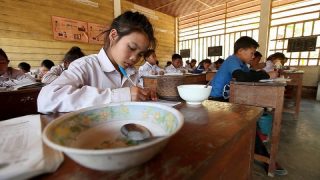
(c) GPE
16-05-2016, GPE | Even though the Millennium Development Goals rallied efforts around health, education, water and sanitation, we are far from the universal provision of these most essential services. The emphasis on universal access to these basic needs has made its way into the sustainable development agenda as well.
And the call to make simultaneous progress on all these needs at once has never been more acute.
With no clean water or sanitation, health will suffer; with limited knowledge of nutrition advice, stunting will persist and mortality rates follow.
Similarly, hungry minds do not make for a classroom of engaged children who are learning. And, due to persistent inequalities, there remains a gendered dimension to all of these challenges too.
Studying how education supports all development goals
The similarities and differences between these different sectors is something the 2016 GEM Report, ‘Education for people and planet,’ will investigate. Launching on September 6th this year, the Report looks at the pressing need for inclusive social development if we are to create sustainable futures for all.
We are starting our outreach efforts with new audiences, in order to practice what we preach at the Women Deliver Conference this week in Copenhagen. Gathering together speakers from GPE, UN Women, NORAD, UNFPA and the Wellbeing Foundation, we will be presenting the leanings of some of our initial findings and asking for their own experience in collaborative work activities.
Our report confirms that there are powerful intergenerational health and fertility effects of mother’s education, which can transform societies. It shores up the fact that maternal education is one of the strongest determinants of child mortality, independent of family income.
Mothers with more education are more likely to seek prenatal care, birth attendance by trained medical personnel, immunization, and modern medical care for their young children.
They are also more likely to protect their infants and children from health risks, for instance by boiling water and avoiding unsafe food.
Education can create healthier societies
Similarly, the spread of education deeply transforms communities, by altering family preferences, social norms and cultural practices, which can lead to lower fertility levels that facilitate investment in children’s health, nutrition and education.
Specific non-formal education programs may be effective in helping women plan childbirth, for instance, and to better space consecutive births. Likewise, education can empower women to greater influence when families discuss the desired number of births that will give their children a stronger chance of surviving through to adulthood.
Let’s think this through practically. Schools can serve as the infrastructure for the delivery of key health related interventions, such as school meals, deworming campaigns, or water and sanitation (WASH) programs for instance.
Curricula can improve their health education on sexual and reproductive health, for instance, or obesity prevention. And such school-based interventions have been shown to improve not just health and education, but also gender outcomes too. Poor access to sanitation in schools can impact particularly girls and women, for instance.
Joining forces for greater results for girls and women
The joint program that has been launched by UNESCO, UNFPA, and UN Women called ‘Empowering Adolescent Girls and Young Women through Education’ is an example of how collaborative working can help address the common barriers to basic needs suffered by the most marginalized the world over.
The program envisions an integrated approach to promote education, gender equality and good health, resulting in the empowerment of adolescent girls and young women.
The persistent gender dimension to health and education inequalities requires a better understanding of how gender works as a social construct rather than a biological fact. According to UN Women, it will require tackling three dimensions: reducing women’s socio-economic disadvantage, addressing gender stereotyping and gender-based violence, and strengthening agency, voice and participation. It was a pleasure to invite them to speak about these needs at our event, and ensure we are all speaking as one.
We have to think differently, and speak to new audiences in order to tackle our common barriers to progress that leaves no one behind. The fact of the matter is that the vast majority of the world’s population does not have access to the kinds of services implicit in the sustainable development goal’s targets.
